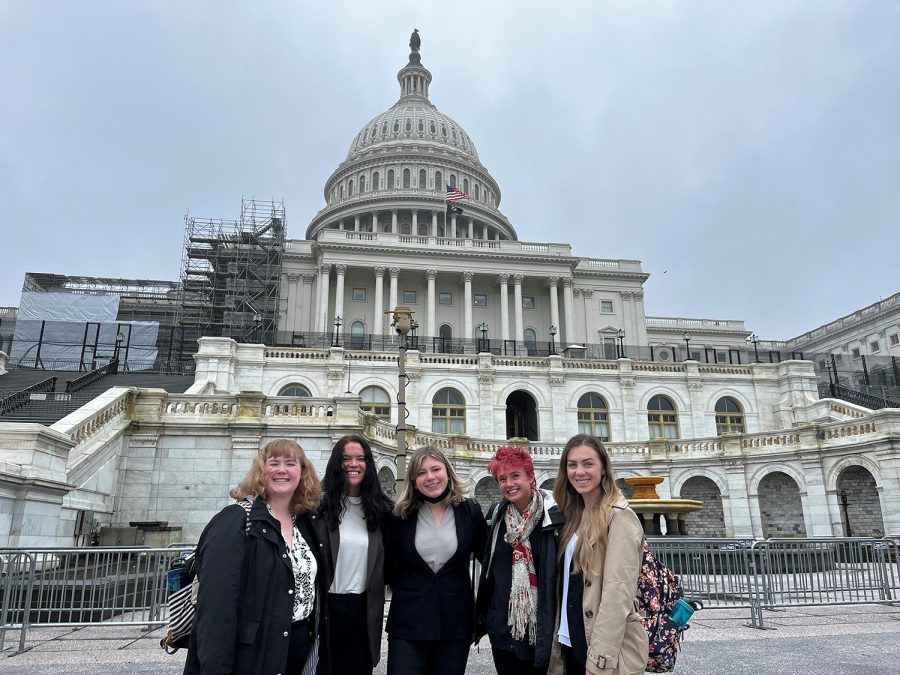UI provides four seniors an education in human rights advocacy
Four seniors in the Human Rights Certificate program at the University of Iowa started their involvement in human rights and education advocacy through a supervised internship.
Contributed photo, from left to right, of Lauren Fuller, Delaney Patrick, Olivia Friederick, Esti Brady, and Grace Wenstrom. The group traveled to Washington, D.C., to speak to congress members.
May 8, 2022
Four graduating University of Iowa seniors found a purpose for human rights advocacy and activism in the university’s Human Rights Certificate.
Through the certificate, Grace Wenstrom, Lauren Fuller, Kirsten Smith, and Levi Bowman were a part of a guided internship at Scholars at Risk, a national organization that aims to protect international scholars and academic freedom.
Fuller, a political science major, said she and Wenstrom — a journalism and mass communications major — went to Washington, D.C., to speak to Sen. Joni Ernst, R-Iowa, Rep. Ashley Hinson, R-Iowa, and Rep. Cindy Axne, D-Iowa, in April about a human rights case. Wenstrom said the team was assigned the case of Ilham Tohti, a Uyghur economist who was detained for creating a website for Uyghur-Han cross-cultural communication.
Each member of the team led meetings with the members of Congress. Wenstrom led a conversation with staffers from Ernst’s office.
“I would say they were receptive. Kind of like all the others, they had a little bit of apprehension, just in terms of [the] human rights angle, most of the staffers wanted to go toward like, ‘OK, how’s this economically affecting us,’ and kind of a protectionist type of angle,” Wenstrom said.
Through Scholars at Risk, the seniors worked alongside Clare Farne Robinson, Scholars at Risk advocacy director.
“University of Iowa students raise awareness about the persistent, deeply concerning, global problem of wrongful prosecutions and imprisonments of scholars and students,” Robinson said. “But, perhaps even more important, the students’ actions remind the world that imprisoned scholars are not forgotten. They remind the scholars and their families that the higher-education community remembers them, values them, and continues to support them.”
Wenstrom said the conversations with the congressional staffers taught her to be assertive.
Before coming to the UI and taking the Seminar in Human Rights Praxis: Supervised Internship, each member of the group had an interest in human rights and advocacy, Fuller said.
“We’ve all kind of talked about being interested in human rights and advocacy and social justice awareness,” Fuller said.
Bowman, a global health studies major, said he started his work in advocacy after seeing his father, an Iowa senator, pursue advocacy and activism.
“I just started working with the Democratic caucus in Iowa,” Bowman said. “And so, that just kind of turned into more of an advocacy role.”
Smith, a communication studies major, came into college with the intent of getting into women’s rights, but changed her mind when she discovered the Human Rights Certificate.
“Once I got into human rights through the certificate, I figured out that that’s what I want to do,” Smith said. “And I’m actually going to be attending a graduate program for human rights in the fall.”
Wenstrom started noticing social inequities at a young age and was concerned. It was during her time at the UI that she started to get involved in the legal side of advocating for human rights.
“I kind of carried that through to my summers in college, that’s really when I first started to, like, explore if I wanted to attack it from a legal sense or not,” Wenstrom said. “So I did some volunteer work and Legal Aid firms and things and really started to build my interest that way.”
All four seniors said the professors within the Human Rights Certificate helped foster their dedication to human rights and advocacy.
“Even just feeling a passion, while they’re lecturing, is sometimes intense,” Smith said. “It’s so inspiring and makes you want to be like them and learn what they know.”














